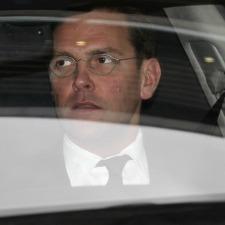BROOKE GLADSTONE: James Murdoch stepped down this week as Chief of News International, Rupert Murdoch’s British newspapers, though he’ll still be working elsewhere in his dad’s media empire. James’ departure follows revelations by British police investigator Sue Akers that the company had bribed multiple police officials, not just a few cops, and not just at the News of the World, but at the Sun tabloid too. All this bad news in Britain has renewed speculation over here that the Murdochs may have run afoul of US law, specifically the Watergate era Foreign Corrupt Practices Act. The FCPA was penned to punish US-based businesses who, say, bribed foreign prime ministers for fighter jet contracts.
But over time, American courts have broadened the scope of the FCPA. When the News Corp phone hacking scandal first broke, most experts agreed that the scale of the scandal was too small to interest US prosecutors. But ProPublica’s Jake Bernstein says that assessment is old news.
JAKE BERNSTEIN: Yeah, that changed this week when Sue Akers, who is the deputy assistant commissioner of the Metropolitan Police in London, testified before a parliamentary commission.
SUE AKERS: Payments have been made not only to police officers but to a wide range of public officials. There also appears to have been a culture at The Sun of illegal payments, and systems have been created to facilitate those payments, whilst hiding the identity of the officials receiving the money.
JAKE BERNSTEIN: What’s particularly problematic for News Corp is there’s a part of the Foreign Corrupt Practices Act called the Books and Records Provision. It’s sort of this weird Catch-22 where if you don’t properly account for the bribes that you have been giving to foreign officials, that can put you in quite a bit of trouble.
[BROOKE LAUGHS]
And so, it seems like Akers at least was sort of hinting at the fact that there was a pattern where people at the papers knew that this was wrong and that they weren’t properly accounting for these payments to government officials. So that could be quite problematic.
BROOKE GLADSTONE: But the thing is, is that either the evidence of corruption is broad enough to fall under this act in the United States or it isn’t. When will we know?
JAKE BERNSTEIN: These kinds of investigations can take years. Part of what Justice wants to know, and apparently News Corp is investigating this themselves, is how widespread is this. Is this just two newspapers in Britain or was this happening at other media outlets across the company and across the world? And it’s clear that News Corp has been handing over material to the police, and presumably they would hand over material to the FBI and to the Justice Department, as well.
What Murdoch wants to do is draw a line under this and say, this was the past, these behaviors were terrible and we don’t do that anymore. We’ve got new procedures in place so that this won’t happen again. And the way you can do that and convince a government to go easy on you is by making a clean breast of the whole affair. So I think if – if there was other stuff going on, then both governments are gonna know about it fairly soon.
BROOKE GLADSTONE: In earlier testimonies, we have seen evidence that Rupert Murdoch has been actively involved in all of his companies, with daily morning phone calls. I just don’t know how he can stay with the company and yet now declare the company to be clean when it would seem he would have known of these practices all along.
And the fact that James Murdoch has stepped down from the company’s British properties doesn’t really mean anything.
JAKE BERNSTEIN: Well, there’s been some turnover at the newspapers themselves. I mean, he closed News of the World, of course. And I think – I mean, that’s gonna be a balancing act for Murdoch as sort of how do you make the case that this behavior is a thing of the past but keep all the same people in place? Some people are gonna probably have to be sacrificed. There’s only so many executives you can ship to – publications in Australia.
BROOKE GLADSTONE: [LAUGHS]
JAKE BERNSTEIN: There are definitely shareholders of News Corp who are actively asking for changes at the top. And if there was a settlement with Justice over their Foreign Corrupt Practices Act, then those calls will probably even get louder.
BROOKE GLADSTONE: Up for any prognostication, Jake?
JAKE BERNSTEIN: [CHUCKLES] If I had to guess, I would guess that there will be a settlement, that it will happen sometime in the next year or two, that this won’t go to trial and that it will ultimately, given the size of the company, not be that big a deal.
BROOKE GLADSTONE: So we’ll all wake up and find out this was just a dream.
JAKE BERNSTEIN: [LAUGHS] Yeah – yes.
BROOKE GLADSTONE: Jake, thank you very much.
JAKE BERNSTEIN: Thank you, Brooke.
BROOKE GLADSTONE: Jake Bernstein is a business and financial reporter for ProPublica.

